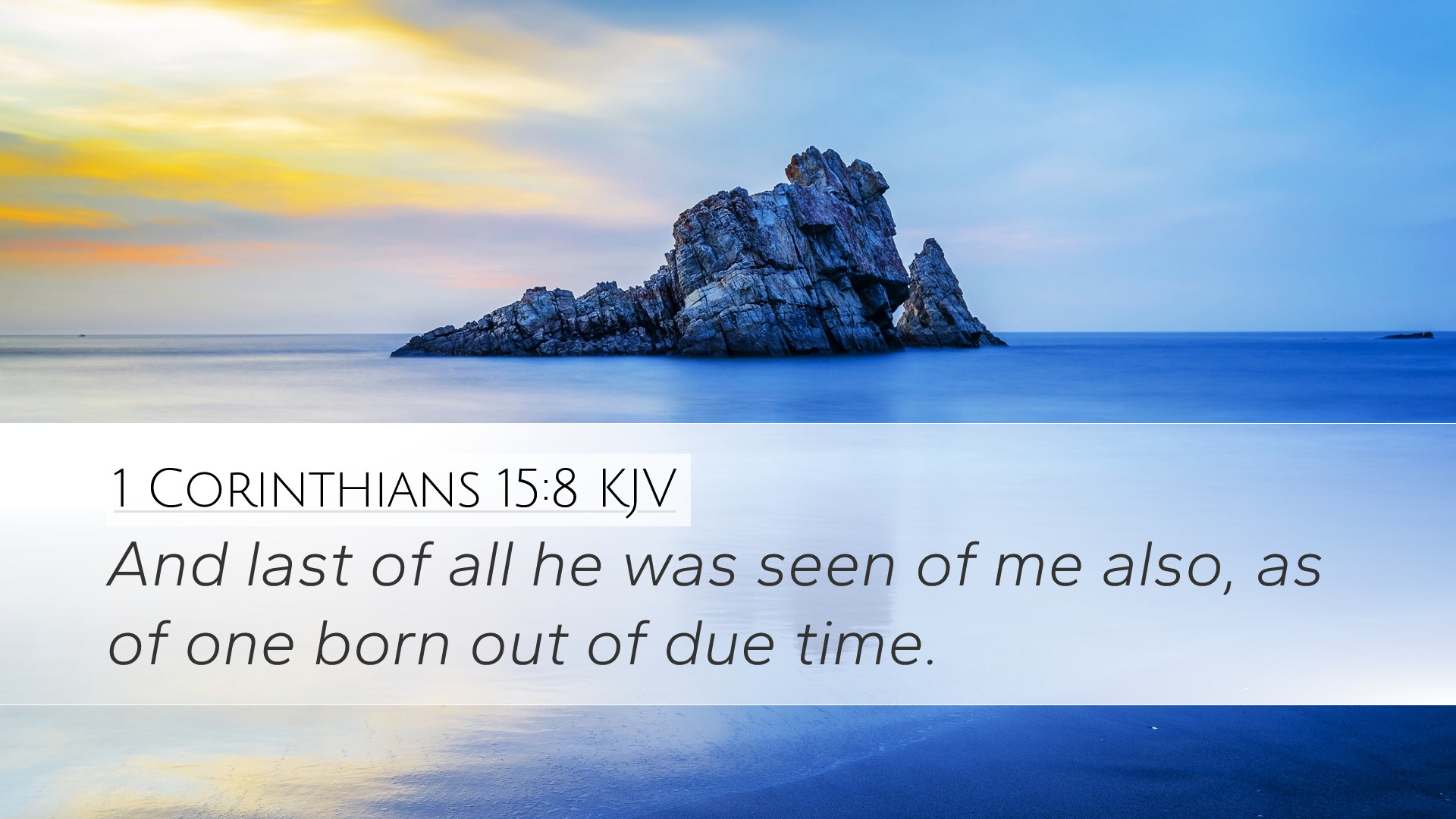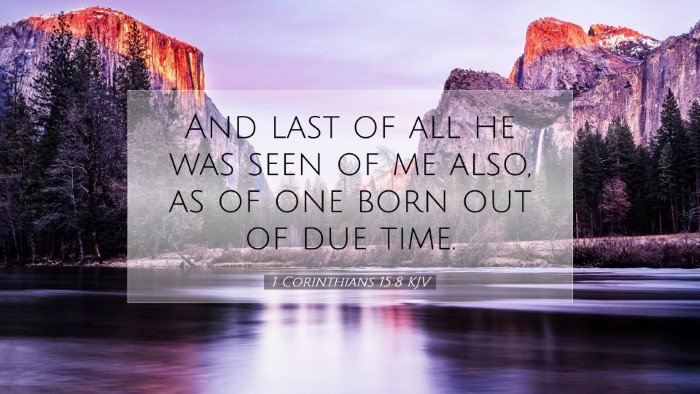Commentary on 1 Corinthians 15:8
Verse: 1 Corinthians 15:8 - "And last of all, he was seen of me also, as of one born out of due time."
Introduction
This verse, nestled within Paul's grand discourse on the resurrection, carries profound theological weight. It not only serves as a personal declaration from the Apostle Paul but also emphasizes the significance of the resurrection appearances of Christ. In examining this verse, we draw from the insights of esteemed public domain commentaries such as Matthew Henry, Albert Barnes, and Adam Clarke to provide a rich understanding for pastors, students, theologians, and scholars.
Contextual Background
In 1 Corinthians 15, the Apostle Paul addresses the Corinthian church’s misconceptions about the resurrection of the dead. He systematically presents the evidence of Christ’s resurrection through various witnesses, culminating in his own encounter with the risen Lord. This moment is noteworthy not only for its theological implications but also for its autobiographical nature, as Paul asserts his unique experience among the apostles.
Analysis of the Verse
This verse can be dissected into two primary components:
- Paul’s Apostolic Claim: "last of all, he was seen of me also."
- The Nature of His Calling: "as of one born out of due time."
Paul's Apostolic Claim
Paul asserts that he is among those who witnessed the resurrected Christ, adding a personal dimension to his apostolic authority. Matthew Henry emphasizes that Paul's encounter was not just an anomaly; rather, it was pivotal for the early church's understanding of apostolic legitimacy. Paul’s reference to himself in this context reaffirms that he, too, shares in the foundational experiences of the faith.
Witnessing the Resurrection
Paul's use of "last of all" highlights the completion of Christ's revelation of Himself to His followers. Albert Barnes notes that Paul's late vision serves a unique purpose, illustrating that even those who come to faith later are not excluded from the grace of God. Paul identifies himself distinctly among the apostles, fostering a sense of authority yet humility.
Theological Significance
Paul's assertion raises key theological questions and answers regarding the nature of apostolic authority, the inclusiveness of calling, and the transformative power of the resurrection.
Apostolic Authority
The credentials of an apostle included having seen the risen Christ. Adam Clarke points out that Paul’s late encounter was a remarkable evidence of divine grace, serving to validate his ministry. It challenges modern scholars to consider the dynamics of calling and its implications for church authority today.
Inclusion in the Faith
This notion of being "born out of due time" distinguishes Paul from the other apostles, raising questions about the inclusiveness of Christ's message. Matthew Henry suggests that this inclusion underscores the idea that God’s grace is bestowed according to His sovereign will, not bound by human conventions or timelines.
Transformative Power of Encounter
Paul's transformative encounter is emblematic of the resurrection's power to change lives. The phrase "born out of due time" reflects not just a chronological difference, but a spiritual rebirth that can come at any moment. This highlights the urgency and accessibility of the gospel message, where even the least likely candidate can be embraced by Christ.
Conclusion
1 Corinthians 15:8 serves as a profound reminder of the breadth and depth of God's grace. By applying these insights drawn from Matthew Henry, Albert Barnes, and Adam Clarke, readers can appreciate the complexity of Paul’s statement and the implications for the church today. Understanding that each believer's encounter with Christ, regardless of timing or circumstances, holds significance in the narrative of resurrection, encourages deeper reflection on the power of the Gospel.
Final Thoughts
For pastors, students, theologians, and scholars, this verse exemplifies the continual call and transformative work of Christ in the lives of believers. As we engage with these biblical truths, may we continually seek the face of the risen Lord, just as Paul did, recognizing the profound reality of His resurrection in our own lives.


